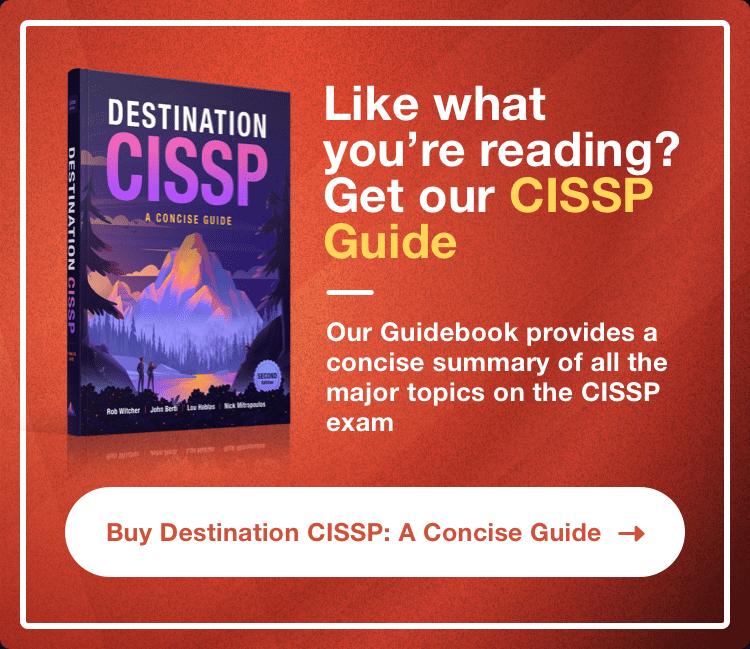Let's get real for a moment.
The Certified Information Systems Security Professional (CISSP) exam is tough, no doubt about that. But it doesn’t mean that it’s some sort of unbeatable boss level. You can totally pass it on your first try if you play your cards right. This includes reading the right materials and rigorously preparing for the exam. Sounds a bit daunting, doesn't it?
Well, take a deep breath and chill. We've got your back. Armed with proven tips and strategies from our arsenal, we’re here to help you prep the right way. So, if you're geared up to ace this thing on your first shot, follow our proven tips and tricks below.
Let’s begin!
Understand the CISSP exam structure
First things first: if you're setting sights on acing the CISSP, one of the most crucial steps is familiarizing yourself with the CISSP exam structure. Why, you ask? Well, think of it this way: when you understand the rules of the game, you're halfway to winning it.
To prepare for the CISSP exam, study the CISSP exam outline, use official guides and online courses, join study groups, and practice with sample exams. Focus on weak areas and adjust your study plan as needed.
Understanding the CISSP exam's structure isn't just a recommendation—it's essential. This isn't merely about how many hours you'll sit in an exam room or what kind of questions will pop up. The CISSP exam is a reflection of the 8 domains of the CISSP Common Body of Knowledge (CBK). These domains are the backbone of the CISSP, offering a blueprint of the broad topics and knowledge areas you'll be grappling with.
Knowing the layout, flow, and style of questions, along with the CISSP domains, will not only put you at ease but also allow you to strategize your preparation. It's like getting a map before embarking on a trek; it ensures you don't waste energy wandering aimlessly but instead tread confidently towards your destination.
Now, let's dive into the specifics.
The CISSP exam is now exclusively offered in the Computerized Adaptive Testing (CAT) format for all languages, effective April 15, 2024. This includes English, Chinese, German, Japanese, Korean, and Spanish in which the exam is available. The shift to CAT for all languages ensures a consistent testing experience worldwide.
CAT format
The CAT is a dynamic examination system. You're given 3 hours to complete the CAT exam, which may sound ample, but every minute counts. The questions are adaptive, meaning they recalibrate based on your answers.
If you answer a question correctly, expect the next one to be more challenging. Conversely, if you struggle with a question, the following one might be slightly easier. The total number of questions varies depending on your performance, ranging from 100 to 150 questions.
With this new format, all candidates, regardless of the language they take the exam in, will experience the same adaptive testing approach. This ensures a consistent and efficient examination process for all CISSP aspirants worldwide.
The CAT format's shorter duration and variable question count allow for a more focused and personalized assessment of each candidate's knowledge and skills across the CBK domains.
With a clear understanding and targeted preparation, the CISSP exam difficulty transforms from a daunting hurdle to a well-charted path to success.
CISSP study techniques to succeed in your first try
Once you've got the CISSP exam landscape mapped out, it’s game time. Gearing up for the main event. This isn't about caffeine-driven study sessions or last-minute scrambles. It’s about being sharp, deliberate, and playing your cards just right.
Here’s how you can gear up to knock that CISSP out of the park on your first swing:
Choose the right study materials
First off, your study materials are everything. They’re the bedrock of your entire journey. You don't just need a heap of info; you need the right one. The Official Study Guide is a must-have. It is detailed, rich, and all-encompassing. It gives you the full view, connecting all the CISSP domains explained.
Now, while having an extensive guide is invaluable, there's also a need for something crisp, clear, and concise. Enter the Destination CISSP study guide. Think of it as your quick-fix guide, boiling down all the CISSP domains into easily digestible bites. It's your go-to for those quick peeks during a coffee break or a snappy review before hitting the sack.
Engage in active learning
Reading's great, but to really get CISSP-ready, you need to roll up those sleeves and dive in. Active learning is the name of the game here. The secret weapon? Interactive tools like flashcard apps.
Take the CISSP Flashcard app, for instance. It's not about information overload; it’s about guiding your focus, and showing you where action is needed. You can tag what you know and spotlight what needs more studying. It’s basically a personalized study experience that ensures you're not just moving, but moving with purpose.
Remember, in the CISSP journey, it's not just about covering ground but ensuring every step is anchored in understanding.
Enroll in CISSP training courses
Self-studying for the CISSP exam can be a great approach to increasing the odds of passing the CISSP exam for the first time. But sometimes, a structured pathway can be a game changer. Enrolling in something like a CISSP Training Masterclass can offer a curated learning experience. It's rigorous, thorough, and led by experts who have helped tens of thousands of students get certified. You'll get the deeper dives, the hands-on drills, and those invaluable moments that lightbulb up your understanding.
Now, if you want more focused training, consider opting for CISSP personal mentoring. This approach offers you a dedicated CISSP mentor who's just a call away, ready to provide tailor-fit advice and strategies. They basically guide you through every twist and turn of your certification journey, ensuring you reach your destination without breaking a sweat.
Importance of CISSP practice exams
Preparing for the CISSP exam is like gearing up for a marathon. Would you just wake up one day and start running the full distance? Probably not. You'd train, practice, and prepare to make sure you're ready for the big day. The same logic applies when you're prepping for the CISSP or any other major exam. This is where practice exams swoop in, becoming your indispensable training buddy.
Let's break down why they’re the real deal:
Simulating the exam environment
Practice exams create a mirror image of the actual exam environment, letting you know what to expect. No surprises. No curveballs.
You become familiar with the question format, the style, and even the pressure that comes with the ticking clock. By the time you sit for the actual exam, it feels like you've been there before, creating a sense of comfort and confidence.
Identifying weak areas
We all have our Achilles’ heel. But wouldn’t it be great to know where you might stumble before the main event? Practice exams give you that insider info. By assessing your performance, you can pinpoint those pesky areas that might be causing you trouble. Maybe it’s a particular CISSP domain or a certain type of question.
Once you've identified them, you can channel your energy and resources to turn those weak spots into strengths.
Building stamina and time management skills
The CISSP isn’t a sprint; it's a marathon. And just like long-distance running, you need stamina to endure and strategies to pace yourself. Practice exams help you develop both. They train you to sit, focus, and perform for extended periods.
Simultaneously, you learn to manage your time efficiently, ensuring you give adequate attention to every question without letting the clock psych you out.
How to pass CISSP exam without experience on the first attempt
If you're aiming to pass the CISSP exam without any experience on your first attempt, it's a bold move, but not an impossible one. However, it's essential to be well-informed and strategic in your approach.
First, the exam is designed for seasoned professionals, and the CISSP certification requirements underscore this fact. Typically, an aspirant needs five years of full-time, paid work experience in two or more of the eight CISSP domains.
But, there's a bit of a workaround: the ISC2 Associate route. By taking this path, you can pass the exam without the required experience. However, instead of earning the CISSP title outright, you'll be designated as an ISC2 Associate. Over time, as you gain the necessary experience, you can then transition to a full CISSP credential.
Now, while you might lack direct CISSP-relevant experience, having a foundational knowledge can still give you an edge. Pursuing related certifications such as CompTIA Security+ or CCNA Security can provide a platform of understanding, making the CISSP materials more accessible and comprehensible.
These certifications, while not as advanced as CISSP, cover many core cybersecurity concepts and practices that serve as a stepping stone to the more in-depth topics of CISSP.
However, it's crucial to acknowledge that without direct experience, your journey to CISSP exam success will demand more effort. It's not just about rote memorization; it's about understanding complex cybersecurity scenarios, decision-making processes, and risk management strategies at a granular level.
Tips on Passing the CISSP on your first attempt
Passing the CISSP on your first attempt isn't solely about the months of rigorous preparation leading up to it. Yes, knowing your stuff is pivotal, but being mentally and logistically ready for the exam itself is just as crucial.
Again, earning a CISSP is like joining a marathon: it's not just about the long runs; it's about the taper, the pre-race meal, and the strategy you employ when you hit the track.
The day before the exam
The day preceding the exam is not for cramming, but for fine-tuning and mental prep. Here's how to ace it:
- Relaxation and mental preparation: The mental game is half the battle. Engage in relaxation techniques, be it meditation, light reading, or even a short walk. The idea is to calm the nerves and clear the mind.
- Organizing logistics: Avoid last-minute chaos. Double-check your exam location and the route to get there. Ensure you have the required identification and any other essentials set out and ready to go.
- A quick review: Note the word "quick." This isn't about diving deep, but a light brush-up, especially on formulas or concepts you've marked as tricky during your study.
Exam day
This is it—the day you've been preparing for. Here's how to navigate it with finesse:
- Arriving early: Punctuality is more than just being on time. Arriving a bit early gives you a moment to breathe, get accustomed to the environment, and settle any pre-exam jitters.
- Reading questions carefully: It might sound basic, but under pressure, it's easy to misinterpret a word or two. Ensure you grasp what's being asked before marking your answer.
- Managing time effectively: The CISSP is a long exam. Regularly check the clock, but don't obsess over it. Have a rough idea of how much time you want to spend per question, keeping some buffer for the more challenging ones.
- Trusting your instincts and first responses: More often than not, your first instinct is right. Overthinking can lead you down a rabbit hole of doubt. Trust your preparation and the knowledge you've accumulated.
Ready to ace the test on your first attempt?
Mastering the CISSP exam is more than just cramming information; it's a strategic run that requires precision, preparation, and persistence. From meticulously selecting the right study materials and actively engaging with your content to wisely utilizing practice exams and making smart choices on the day before and during the exam, every step holds significance.
But remember, like in any journey, having the right travel companion makes a world of difference. Enter Destination Certification. We're not just here to guide you; we're your steadfast partner, offering a plethora of resources tailored to your CISSP journey. From expert-led CISSP training classes to intuitive practice test apps and more, acing the test will never feel more attainable.
With Destination Certification by your side, you're not just preparing to pass; you're gearing up to excel.
Rob Witcher
Rob is the driving force behind the success of the Destination Certification CISSP program, leveraging over 15 years of security, privacy, and cloud assurance expertise. As a seasoned leader, he has guided numerous companies through high-profile security breaches and managed the development of multi-year security strategies. With a passion for education, Rob has delivered hundreds of globally acclaimed CCSP, CISSP, and ISACA classes, combining entertaining delivery with profound insights for exam success. You can reach out to Rob on LinkedIn.





